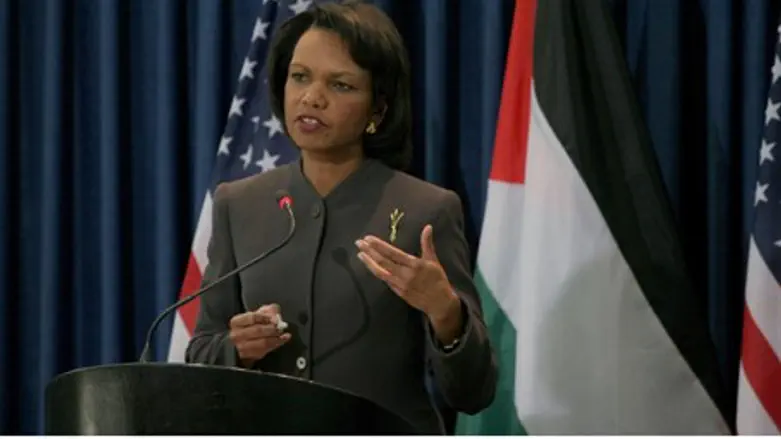
Former U.S. Secretary of State Condoleezza Rice said on Tuesday that prospects for peace between Israel and the Palestinian Authority are far worse today than when she left office.
Speaking to The Associated Press, Rice said she partly blames the Obama administration’s tough line against Israel and its construction of Jewish homes in Judea and Samaria for the impasse in negotiations.
“When you look at where we are now, we’re a long, long way back from where we were,” Rice said, adding she had hoped that the Obama administration could revive the stalled peace talks quickly when it took office in 2009.
She said she was disappointed by the Obama’s handling of the issue of new Israeli housing construction in Judea and Samaria.
“I do think focusing on settlements in that particular way was a mistake,” Rice said. “The parties then were able to have a reason not to sit down.”
The Obama administration imposed a ten-month building freeze on Israel in an attempt at satisfying PA demands and drawing its officials to the negotiating table. However, that attempt failed when PA Chairman Mahmoud Abbas refused to negotiate.
Now, Rice told AP, the gap has only widened “and they’re running out of time.” She did not sound optimistic for a peace settlement, or even for new talks, anytime soon.
“When they’re not talking, they’re sliding backward,” Rice said.
On Tuesday, Rice’s new memoir, “No Higher Honor”, was published. The memoir sheds some light on the groundbreaking offer made by former Israeli Prime Minister Ehud Olmert to Abbas in 2008.
Rice describes in the book how determined Olmert was to reach an agreement with Abbas, going so far as to offer him 94 percent of Judea and Samaria, a shared jurisdiction of Jerusalem, and allowing 5,000 PA Arabs who left their homes in 1948 back into Israel.
Rice writes in the book that the offer fell through when Abbas refused to accept it, despite efforts by her and then-President George W. Bush to convince him to accept.
Despite Abbas’ rejection of the offer, Rice suggested her successors might have been able to use the momentum from those negotiations to keep talks alive.
She told AP she left a record of the intensive negotiations she led in 2008 for the new Obama administration, in hopes that a new team of negotiators could pick up where the sides had left off when Bush left office.
